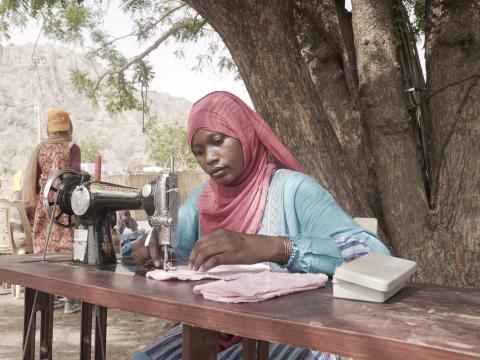Supporting Menstrual Hygiene Through Production of Quality Reusable Sanitary Towels in Sudan

Many adolescent girls in Sudan suffer in silence during their monthly periods. Compounded by cultural sensitivities around menstruation, poverty, stigma, ignorance and unavailability of affordable sanitary towels, many girls often find themselves with no choice but to use whatever available means to manage their periods. This includes using old pieces of cloth which sometimes lead to infections, especially when hygiene is not well observed.
Disposable sanitary towels are also not very common in hard to reach remote areas where World Vision operates. When available, the price is prohibitive, becoming a barrier to access. This contributes to regular absenteeism from school by girls to avoid the associated shame.
To help support girls through their menstrual cycles, World Vision sought to promote reusable sanitary towels as an alternative safe and affordable option for menstrual hygiene management.
This was the first time reusable sanitary towels were being produced locally in Sudan. A pilot was first conducted in Blue Nile state with funding from the USAID-Bureau for Humanitarian Assistance (BHA). Three designs were developed, in consultation with various ministries and UNICEF, using locally available cotton fabric. 200 pieces of each design were prepared and distributed to one hundred girls across four localities. A user survey was then conducted to get feedback from the girls, to ensure that their input was incorporated in the final designs to enhance acceptance and use.
In collaboration with local public health officers, the girls were trained on proper and safe use of the re-usable sanitary towels.
To promote sustainability and access to these kits, six women groups of 15 women each from six localities were trained and equipped with start up kits for making the reusable sanitary towels. The groups made 5,000 pieces, which World Vision purchased and distributed to 500 girls.
World Vision is now working with some of the trained women to train other women’s groups in South Kordofan, South Darfur and East Darfur to scale up the project. 5,000 girls are targeted with this scale up, with funding from UNICEF, Global Affairs Canada (GAC) and USAID BHA.
The women are now enjoying improved household income through this initiative. To enhance sustainability, World Vision facilitated linkages between the trained women groups and local suppliers to ensure ease of access to raw materials. This will help the women groups to continue to produce and expand their businesses.
The initiative also opened important conversations among stakeholders, between girls and their mothers, sisters and peers, on a subject that was previously regarded as taboo.